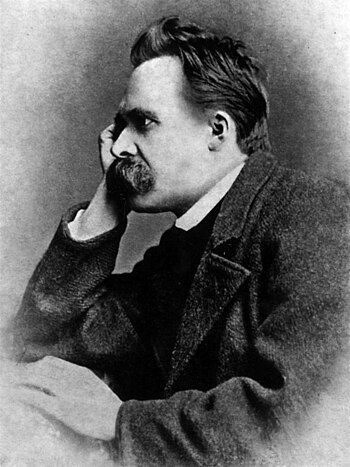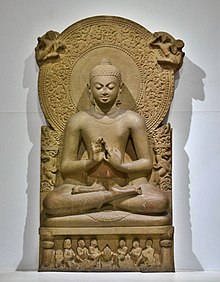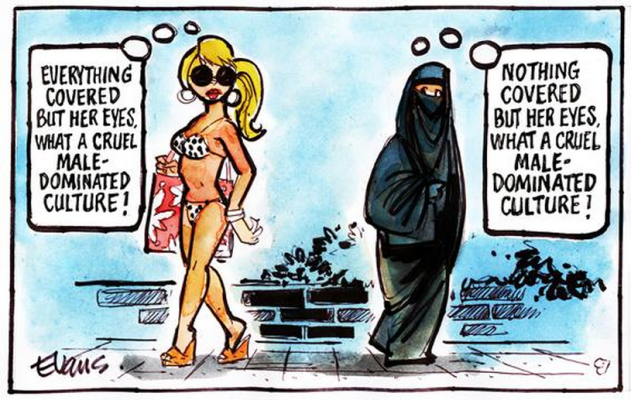In the 1960ies we often heard it said that God was dead.

Friedrich Nietzsche and his mother. (Photo credit: Wikipedia)
Carl Ludwig Nietzsche, was appointed pastor at Röcken by order of King Friedrich Wilhelm IV of Prussia, after whom Friedrich Nietzsche was named. Before Friedrich Nietzsche’s fifth birthday his father died in 1849. He was left to live in a household consisting of five women: his mother, Franziska, his younger sister, Elisabeth, his maternal grandmother, and two aunts.

Friedrich Wilhelm Ritschl (1806–1876) (Photo credit: Wikipedia)
After attending a private preparatory school, the Domgymnasium, he was admitted to Schulpforta, Germany’s leading Protestant boarding school. Having graduated in 1864, he went to the University of Bonn to study theology and classical philology. Influenced by the textual criticism of the English and German classicists Richard Bentley and Gottfried Hermann, F.W. Ritschl, in full Friedrich Wilhelm Ritschl became a classical scholar remembered for his work on Plautus and as the founder of the Bonn school of classical scholarship. It was under the tutelage of Ritschl in Leipzig that he further developed and became the only student ever to publish in Ritschl’s journal, Rheinisches Museum (“Rhenish Museum”). Ritschl assured the University of Basel that he had never seen anyone like Nietzsche in 40 years of teaching and that his talents were limitless and as such would be the best candidate to receive a professorship in classical philology that fell vacant in 1869 in Basel, Switzerland.

English: Portrait of Friedrich Nietzsche, 1882; One of five photographies by photographer Gustav Schultze, Naumburg, taken early September 1882. Public domain due to age of photography. Scan processed by Anton (2005) (Photo credit: Wikipedia)
In his mature writings Nietzsche was preoccupied by the origin and function of values in human life.With his protestant background one can wonder if his expression “God is dead” was not misinterpreted.
Many people seem to assume that this implies God was once a living creature, and he has since passed away. But this is a misconception. Nietzsche was an atheist, and thus never believed that a God existed in any form except as a figment of the human imagination. {Nietzsche: God is Dead (Part 1)}
Though we do find this man writing a lot about God and looking at the Judeo-Christian tradition, which according to him made suffering tolerable by interpreting it as God’s intention and as an occasion for atonement. For him this clinging to a flattering doctrine of personal immortality, could also seen as man having created its god to feel safe and sure, but those who did not believe in a god or God also tried to cling to an other “true” world, also offering symptoms of a declining life, or life in distress.
But for Nietzsche when there is no god man also has not need of a god and man did not have to create a “slave” and “master” world, but should be himself the master. Facing the gut (“good”), schlecht (“bad”), and böse (“evil”) was something we made up ourselves as a nonmoral reference to those who were privileged, the masters, as opposed to those who were base, the slaves. For him his generation had come in a timespan where religious and philosophical absolutes had dissolved in the emergence of 19th-century positivism.
With the collapse of metaphysical and theological foundations and sanctions for traditional morality only a pervasive sense of purposelessness and meaninglessness would remain. And the triumph of meaninglessness is the triumph of nihilism: “God is dead.” Nietzsche thought, however, that most people could not accept the eclipse of the ascetic ideal and the intrinsic meaninglessness of existence but would seek supplanting absolutes to invest life with meaning.{Bernd Magnus on Friedrich Nietzsche in the Encyclopaedia Britannica}
Many do forget that as a thinker it might well be that Nietzsche also had come into conflict with the trinitarian thought and the sayings in the Scripture that there is only One true God Who is One and an eternal Spirit, not having bones, flesh or blood, whilst so many people around him worshipped a god with flesh, bones and blood who was born and who died. All such contradictions with what is written in the Old and the New Testament could have muddled his mind.
haukipesukone writes about the thought around that god man had created himself
Eventually the faithful get so worried about the well-being of God, that they build an armour to protect him. {What did Nietzsche mean by God is dead?}
When Nietzsche like others would have thought of that in such saying, he also could see the first sign that people were losing faith in God, also noticing around him how many people had lost faith in Him and did not trust God to take care of himself and able to endanger their safety.
The wannabe-philosopher of Finnish origin continues
Still at first, God is safe inside the armour and people continue to worship him. Over time though, God gets pissed off at the whole situation and leaves, or simply suffocates, leaving the armour for people to worship. People keep worshipping the hollow armour, and religion becomes a meaningless ritual with no substance to it. This is what “God is dead, and we have killed him” means. {What did Nietzsche mean by God is dead?}
An “Autobiographical” philosopher also looks at the German philosopher, extremely critical of Christianity, but sees, like us, that we may not just take it as a sort of atheist statement which would be the “ultimate truth”. For Gabriel J. Mitchell
“God is Dead” simply means “The Christian god is becoming increasingly irrelevant to philosophy and culture”. {What Nietzsche Meant by “God is Dead”}
Mitchell writes:
In popular culture the phrase is often mistaken as an anti-Christian statement. Some sort of declaration of Atheism. This is most obviously manifested in Christian content like the film God’s Not Dead. In the movie, a disgruntled atheist professor demands his students declare the death of God and embrace atheism. {What Nietzsche Meant by “God is Dead”}
With his background and his protestant family it would be strange that with his pretty bold statement that would be going against his own family’s belief and bring a serious anti-Christian message.
The saying „Gott ist tot“ or “God is dead” also known as “the death of God” first appeared in Nietzsche’s 1882 collection “Die fröhliche Wissenschaft” or “The Joyful Wisdom” also known as The Gay Science, also translated as “The Joyful Pursuit of Knowledge and Understanding”. The German Wissenschaft never indicates “Weisheit” or “wisdom”, but concerns any rigorous practice of a poised, controlled, and disciplined quest for knowledge, typically translated as “science”. Nietzsche speaks about “what if” which does not mean “it is”.
As such Nietzsche writes
What if some day or night a demon were to steal after you into your loneliest loneliness and say to you: ‘This life as you now live it and have lived it, you will have to live once more and innumerable times more’ […] Would you not throw yourself down and gnash your teeth and curse the demon who spoke thus? Or have you once experienced a tremendous moment when you would have answered him: ‘You are a god and never have I heard anything more divine.’ — [The Joyful Wisdom §341]

A statue of the Buddha from Sarnath, 4th century CE
A demon or sick person often is seen as a mad person or some one not by his senses. That mad man also can look at different deities and ascetics and sages like Gautama Buddha, probably a very attractive figure for Nietzsche because of all the philosophic thoughts of that teacher who lived in northern India sometime between the 6th and 4th centuries before the Common Era.
We find the first occurrence of the famous formulation “God is dead,” first in section 108.
After Buddha was dead, people
showed his shadow for centuries afterwards in a
cave,—an immense frightful shadow. God is dead:
but as the human race is constituted, there will
perhaps be caves for millenniums yet, in which
people will show his shadow.—And we—we have
still to overcome his shadow! {— §108}

The Joyful Wisdom or The Gay Science, first published in 1882 and followed by a second edition, which was published after the completion of Thus Spoke Zarathustra and Beyond Good and Evil, in 1887.
Section 125 depicts the parable of the madman who is searching for God. He accuses us all of being the murderers of God.
“‘Where is God?’ he cried; ‘I will tell you. We have killed him—you and I. All of us are his murderers…”
God is dead. God remains dead. And we have killed him. How shall we comfort ourselves, the murderers of all murderers? What was holiest and mightiest of all that the world has yet owned has bled to death under our knives: who will wipe this blood off us? What water is there for us to clean ourselves? What festivals of atonement, what sacred games shall we have to invent? Is not the greatness of this deed too great for us? Must we ourselves not become gods simply to appear worthy of it? {Nietzsche, The Gay Science, Section 125, tr. Walter Kaufmann}
Mitchell explains
The line is part of The Parable of the Madman a section from Nietzsche’s The Gay Science. It depicts a maddened individual running around a village asking where he can find God only to declare that God must be dead. In his ever creative style Nietzsche is using this madman as an outlet to explore an idea. Particularly he’s interested in the shifting values of European culture during his lifetime. {What Nietzsche Meant by “God is Dead”}
More and more people took distance from religion, most people confusing God with Church. Having found so many lies in church they considered “God” also being a “fat lie”. Though many wondered what their life was to be and if there was nothing behind it or something hidden for them.
Georg Wilhelm Friedrich Hegel also had pondered the death of God, first in his Phenomenology of Spirit where he considers the death of God to
‘not [be] seen as anything but an easily recognized part of the usual Christian cycle of redemption’
But there some thought Jesus Christ to be the God, and when Jesus is God and Jesus died than really God would have died. Naturally Jesus is not God, because God is a Spirit Who has no beginning and not end and to Whom man can do nothing. In case Jesus is God and has died God would be dead and this did hurt Hegel, who writes about the great pain of knowing that God is dead
‘The pure concept, however, or infinity, as the abyss of nothingness in which all being sinks, must characterize the infinite pain, which previously was only in culture historically and as the feeling on which rests modern religion, the feeling that God Himself is dead, (the feeling which was uttered by Pascal, though only empirically, in his saying: Nature is such that it marks everywhere, both in and outside of man, a lost God), purely as a phase, but also as no more than just a phase, of the highest idea.’.
Nietzsche recognizes the crisis that the death of God represents for existing moral assumptions:
“When one gives up the Christian faith, one pulls the right to Christian morality out from under one’s feet. This morality is by no means self-evident… By breaking one main concept out of Christianity, the faith in God, one breaks the whole: nothing necessary remains in one’s hands.”
Nietzsche saw how man went away from the faith in God and by doing so was looking for new answers or better answers than the churches could give. When not any more believing in the beautiful masterly concept of creation by the Divine Maker belief of cosmic or physical order also fell to the ground.
Nietzsche saw Europe was slowly transitioning into a sort of cultural Nihilism. As advancements in science and technology lead to more and more questioning of the status quo, Philosophical values were beginning to shift. What Nietzsche is getting at here isn’t a declaration of the truth value of Christianity. In fact truth is a topic Nietzsche is extremely critical of. Instead he’s pointing out the weakening of Christian influences on society. {What Nietzsche Meant by “God is Dead”}
Clearly the church was loosing its grip on the citizens. The ability to have the Bible in print and available to lots of people, made them also aware that for years those churches had lied about many things. Those who really went to study the Scriptures where confronted with many things the church said which were not written at all in the Bible.
An other problem arose by the growing knowledge and advancement in the sciences. Several people wanted to play for god themselves.
Later on people can take a look inside the armour and see there is no God there, and say God never existed in the first place. Whether or not God actually exists or existed at any point as an entity in the universe is not as relevant as the fact that there is an inherent need in most people to have faith in God. That in itself does change how people behave, hopefully for the better.
To put this hollow armour analogy in a more abstract way, is that at first people had a genuine faith in God whether or not this faith was reciprocated by an actual God. Over the course of time this genuine God was replaced by a man-made image of God. Man got rid of the real thing in favour of a man-made facsimile. I suppose the underlying motivation is that if man made God, man can also control him. {What did Nietzsche mean by God is dead?}
Seeing how man went away from God Nietzsche probably was very well aware that this could bring man in trouble.
Given Nietzsche’s strong animosity towards religion, you would think people realizing that ‘God is Dead’ would make him happy. After all, Nietzsche was dedicated in his quest to try and rid the individual of dogmatic and supernatural beliefs. Surely, people disregarding religion would be a comforting sight to Nietzsche. But this was not the case. Nietzsche was deeply troubled by the lack of a God, he feared that this may lead to the destruction of our society. {Nietzsche: God is Dead (Part 1)}
The end of Christianity for Europe might bring desolation and chaos. Churches had fostered on human dogma‘s and now people had come to see how different they are to Biblical dogma’s. But when one finds that a church has lied so much would one go for an other church and not face the same problem? Mankind always have nuzzled dogmatic beliefs that are widely held and accepted by society and do not want to do away with so many traditions.
Many of these beliefs go unquestioned, and thus we live in a sort of ‘herd’ similar to sheep (the term sheeple is probably the best representation of this). By overcoming the herd perspective, a man can free himself and achieve new heights. {Nietzsche: The Ubermensch (Part 2)}
When there is no God or when man himself is god, then man may be the master of everything (does he think). When there is no God,like so many think, then man loves to be as a god being the super being or Ubermensch, to which nothing is to small or to big and everything can be made possible. When it is not possible to do something today than it will be possible tomorrow or in the future, so why worry?
The Ubermensch is supposed to act as the answer to the problem of nihilism. Since God is dead, that means there is no objective truth or morality. Thus, an Ubermensch acts as his own ‘God’, abandoning the herd instinct and determining his own morality. He is neither slave nor master, as he does not impose his will on others. He is a master of self-discipline. He must be willing to embrace suffering and learn from it. In a way, the Ubermensch is the next step in human evolution. It’s a new intuition, perspective, and greatness for mankind. {Nietzsche: The Ubermensch (Part 2)}
For sure, man has to take a long way before he shall reach such a state. He also seems to forget that is what the Word of God demands from man, that man work at themselves transforming their character to an ideal being without faults. Only problem that than poses, is to know what would be faults, and what would be the right things to strive for. For a Bible Student no such problems arise because he can find all answers in the Bible. But those who do not want to take a serious look at that Library of ancient works, still many questions shall stay unanswered.
++
Additional reading
- Today’s thought “Ability to see that God is not dead” (May 12)
- Inner feeling, morality and Inter-connection with creation
- Christian values and voting not just a game
- 3rd question: Does there exist a Divine Creator
- Is there no ‘proof’ for God? (And why that statement is not as smart as you might think.)
+++
Further reading
- Moral Collapse Didn’t Begin Yesterday. Occult Paris
- Everything and Nothing
- No Lives Matter
- The Nil God
- Wake up; There is no God
- The death of God (and politics?)
- Because God is not efficient in revealing himself to us, He must not exist.
- With God vs Without
- God
- O God…
- Lunch n’ Bats
- Collecting our thoughts: opening prayer
- A walk on the sea
- The End of the World
- A Defense of Religion (From an Atheist)
- Seraphim Rose: “large numbers of Catholics and Protestants are hardly to be distinguished from unbelievers “
- On Nihilism
- Dostoyevsky’s Übermensch in Crime & Punishment
- God’s Heartbreak
- Can You Be A Happy Nihilist?
- Ep. 48 – Calvin Warren and Frank Wilderson III on Antiblackness, Nihilism, and Politics
- The New Nihilism
- A Journey Toward A Theory Of Stupidity 3 | The Grandfather Of Stupidology Part 1
- The Weaponisation Of Popular Culture
- Chapter 6
- What We Can Gain From Detachment
- Nietzsche and Buddhism
- Buddhism, Nietzsche, Jung, Christianity, and Plato: Religious and Philosophical Themes in Westworld
- Identification
- Who I am and why I’m here
- Übermensch
-
- Nietzsche: Eternal Recurrence (Part 3)
- Nietzsche, a philosophical biography (Rüdiger Safranski, 2000)
- Übermensch by Mathew Babaoye
- Editorial 23: Frank Castle, Ubermensch
- How to become Superman: Nietzsche’s overwhelming concept and questions to ask yourself
- The Ubermensch as an Archetype
+++

























